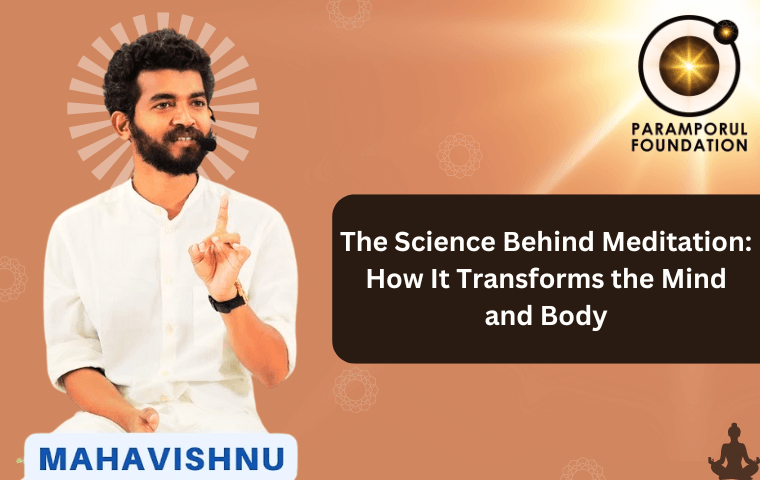Meditation goes beyond merely sitting in silence; it’s a transformative practice that can greatly enhance both your mind and body. As more people explore its benefits, meditation has gained popularity for its ability to enhance mental and physical well-being. Let’s dive into the science behind meditation and discover how it transforms your mind and body.
What is Meditation?
Meditation is a simple practice where you train your mind to focus and redirect thoughts. It’s often used to increase awareness of yourself and your surroundings. Many people turn to meditation to reduce stress, improve concentration, and develop a positive outlook on life. But there’s much more to it. The science behind meditation has shown that it fosters beneficial habits like self-discipline, better sleep, and even increased pain tolerance.
How Meditation Affects the Brain
One of the most fascinating aspects of meditation is how it physically changes the brain. The science behind meditation reveals that it can alter brain structure and function, leading to several mental and emotional benefits.

- Meditation increases the thickness of the gray matter in the hippocampus, the part of the brain responsible for memory and emotional regulation. This change helps improve memory and emotional control.
- Meditation decreases the size of the amygdala, the part of the brain responsible for fear. This shrinkage helps decrease stress, anxiety, and fear, making you more resilient to stressful situations.
- Meditation strengthens the prefrontal cortex, the area of the brain that governs decision-making. This leads to better focus, attention, and self-control.
- Meditation positively affects the hippocampus by increasing its thickness and density, which enhances memory and learning. It strengthens neural connections, improves cognitive function, and helps reduce stress, protecting the hippocampus from stress-related damage. This leads to better overall brain health and resilience.
The Benefits of Meditation
The science behind meditation offers numerous benefits that enhance both mental and physical health:
1. Stress Reduction

Stress is a common reason people start meditating. Studies show that meditation can lower levels of cortisol, the stress hormone, and decrease heart rate. This decrease in stress can result in better sleep, lower blood pressure, and overall enhanced health.
2. Manages Anxiety
By reducing stress, meditation also helps control anxiety. Research indicates that meditation can significantly decrease anxiety symptoms, particularly in people with high anxiety levels. It’s also been found to improve stress reactivity and coping mechanisms.
3. Enhances Emotional Well-Being
Meditation can foster a more positive self-image and perspective on life. It’s been shown to reduce symptoms of depression and negative thinking, helping people develop a healthier emotional state.
4. Enhances Focus and Concentration

Meditation is like exercise for the brain. It strengthens your attention span and improves your ability to focus on tasks. Even a few minutes of meditation each day can enhance memory and attention over time.
5. Increases Self-Awareness
Certain types of meditation emphasize self-inquiry, aiding in the development of a deeper understanding of yourself. This increased self-awareness can assist you in identifying and altering harmful thought patterns.
6. Cultivates Kindness

Meditation, particularly loving-kindness meditation, can increase feelings of compassion and kindness towards yourself and others. This practice cultivates a more positive and forgiving attitude, which can enhance your relationships.
7. Enhances Sleep Quality
Meditation helps you cure insomnia and sleep peacefully. By calming your mind and easing stress, it helps your body get ready for a peaceful night’s sleep.
8. Prevents Age-Related Memory Loss
As you age, meditation can help protect your brain from memory loss. Studies show that regular meditation can slow down cognitive decline by preserving gray matter in the brain.
The Impact of Meditation on Physical Health
Beyond the mind, meditation also has tangible benefits for the body:
- Pain Control: Meditation and yoga can help you manage pain more effectively. By focusing on your breath and body, you can reduce the perception of pain and improve your quality of life.

- Lower Blood Pressure: Meditation can help bring down your blood pressure by easing the stress on your heart. This makes it easier for your heart to pump blood and reduces the risk of heart disease.
- General Wellness: Meditation can be practiced anywhere, anytime, without the need for special equipment. Research on meditation shows that spending just a few minutes each day meditating can boost your overall well-being.
Conclusion
Meditation is a strong practice that can change both your mind and body. By making meditation a regular part of your life, you can reduce stress, improve focus, and enhance your emotional health. If you’re looking to sharpen your mind, manage anxiety, or live a healthier life, meditation is an easy and effective way to help you reach those goals.
Start with just a few minutes a day, and gradually increase your practice. The benefits you’ll experience are well worth the time and effort. Remember, meditation is a journey, and the more you practice, the more profound the changes you’ll see in yourself.

